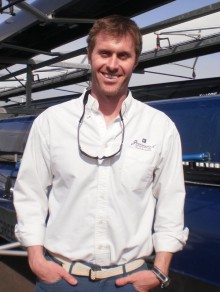 Warren Perry is the Aquatics Director at the Greenwich Water Club outside New York City, where he coaches swimmers, rowers, and triathletes. He also serves as a color commentator and analyst for the Atlantic Coast Conference Swimming Championships.
Warren Perry is the Aquatics Director at the Greenwich Water Club outside New York City, where he coaches swimmers, rowers, and triathletes. He also serves as a color commentator and analyst for the Atlantic Coast Conference Swimming Championships.
It hasn’t always been this way.
Walking on to the deck of this year’s Atlantic Coast Conference Swimming Championships, I take a few moments to greet the coaches, swimmers, and officials on my way to the Broadcaster’s Table. It’s been ten years since I walked these decks as a swimmer for the University of North Carolina. Now, I am a full-time coach of swimming and rowing in Greenwich, CT. I am also fortunate to be a Color Commentator on the Swimming & Diving Championships for the ACC, for which I am in Greensboro this week. Some of the coaches that I chat with are former competitors of mine. Many are former coaches and mentors from when I grew up through the ranks of Age Group. These faces that once met me with distant stares now engage me with smiles and friendly greetings.
I was a closeted swimmer who had his career cut short by injury. Well, that is the way I tell it. In reality, a slight spontaneous pneumothorax (or partial lung collapse, from which I could have returned to the pool) my sophomore year was the excuse that I used to distance myself from the hyper-masculine world of collegiate athletics. Having grown up in a small town in rural North Carolina, I was accustomed to working my way to the top of my sport unnoticed. The background was a place I knew well, and I had become accustomed to hiding. Stepping into the Division I spotlight with the Tar Heels proved to be a challenging task to this closeted lifestyle.
Some of the upperclassmen did their best to welcome the shy butterflyer into the folds, but mostly they seemed too afraid to engage with someone who was “different”. The coach, though gentle and true in his demeanor, was often too focused on the more talented swimmers than those of us on the periphery. In the pool, in the locker rooms, and at the dining halls, I attempted to avoid attention for fear of being found out, but I quietly deeply craved the affirmation and acceptance of my teammates and coaches. We didn’t really have any allies then, and the country was just becoming familiar with the issue of gay rights. But it didn’t come in time for me. After struggling to fit in, I hung up my cap and goggles (after my injury) to retreat to a safer world as a “normal” student. Here, I would have a less chance of being exposed as gay.
Over the course of my 20s, I wrestled with what it meant to be gay and still be an athlete. Though I was no longer a varsity athlete, I still loved sport and had a passion for fitness. This led me to work as a swim coach on the high school and college levels, teach undergraduate courses on sport sociology, and eventually find my way back to the world of elite athletics. All the while, I was having conversations with people as a closeted gay man about masculinity, diversity, and acceptance. I met enemies and allies, experienced victory and defeat, but all the time I was fighting for the peace to become myself.
Finally, a few conversations with straight allies in graduate school were what it took to allow me the comfortable environment to discuss my sexuality in a positive manner. Just before my 29th birthday, I came out to my parents, extended family, and friends. As I came out, some friendships died while others strengthened. But as others around me came to know the true Warren, they came to respect and appreciate me for everything I was and had to offer. This included a skill and passion for coaching sports.
I am very grateful for those family and friends who accept me for a part of being myself. Of course, not everyone is supportive at first; some still struggle with my “lifestyle” choices. Coaching young athletes still has some parents on edge, especially when confusion from the Sandusky case reinforces stereotypes in peoples’ minds. But as I continue to live out of my true identity, and athletes, coaches, and parents interact with me as a true man, change occurs. Allies play a major role in endorsing the truth about people like me. My colleagues in Greenwich are extremely supportive, and a new generation of athletes and coaches are affirming not only our existence but our contributions to sport. As all of the stereotypes for being gay in athletics are challenged, division is bridged and acceptance offered.
The sports world I had once fled was now a place of safety to be embraced. I was once afraid to engage those faces on the pool deck because I did not sense the support of teammates and administration. But now, ten years later, I am working side by side with coaches and swimmers I once feared. As an openly gay coach, I am helping raise up a generation that sees a confident coach, compassionate leader, and a man secure in his identity. As a mentor, teacher, and friend, I am able to help others navigate the often rough waters of homophobic sports. The athletic world is becoming more inclusive of the gay community, and I am excited to have come out from a state of fear in to an era of love and acceptance.
So every time I broadcast college swimming, coach the novice rower, or teach the next 5-year old how to swim freestyle, I smile and think, “It’s not always been this way.” The ACC and my aquatics club are just two reputable institutions that foster truth, honor, and respect. It is with great joy that I file in the ranks of fellow sports leaders who proudly excel in their jobs, becoming known not only for who they love but how they love their sport.
And some of us just happen to be gay.
Much love.











